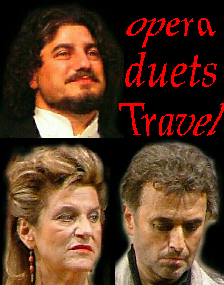New opera for me, so subtitling was good for me, and it fitted the opera very well.
The conductor Anton Guadagna was older and thinner, but a great conductor for Nabucco. I saw a orchestra-member smiling happily at the thought of playing Verdi's music. And really from the pit came wonderful music of Verdi, and that Nabucco is not played more was a mystery. Anthony Michael-Moore was a great choice as Nabucco, even Leo Nucci could not do it better. I think that Michaels-Moore gave more pleasure in the role than Nucci, in his voice was enough italienitá, and he was immersed in the role. Here is the baritone for today and the future.
As Brogni in La Juive did not Alastair Miles impress me, as Zaccaria he did fit more into the role. But also here did he in some instances lack some vocal depth, but it didn't do any harm to this interpretation. I think that Miles had learned from Shicoff how to be a proud Jew.
In the role of Ismaele, as once was one of Carreras first opera roles, we saw and heard Miro Dvorsky, the younger brother of Peter Dvorsky. His voice resembled that of Neil Shicoff, but was more beautiful and egale. A likable fellow, Dvorsky (see picture above).
The two sisters and rivals, Fenena (Michaela Urungureanu) and Abigaille (Eliane Coelho), wonderful voices. Fenena, mezzo with some higher notes almost soprano. Abigaille, soprano, but with some depth not possible for true sopranos. Truly a wonderful and exciting new voice: Michaela Urungureanu !
Eliane Coelho, exciting soprano from Brazil, since long Prima Donna in the Wiener Staatsoper. I have seen her in other roles, but this must be her best. Nabucco without a great singer in this role would be a bore, but Eliane Coelho makes Nabucco a true Masterwork of Giuseppe Verdi.
NABUCCO
Often presented as a political drama, and it is that too, and a story of the conditions of the Jews under Nabucco in Babylonia. But here the emphasis was on the human side, and especially Nabucco relationship to Abigaille and Fenena, his daughters. On the side is the love story of Ismaele and Fenena, they not act and react to the things that happen around them. Only Nabucco and Abigaille is playing an active part in making the story happen.
Nabucco is too power-hungry to see what he is doing to his daughters. Abigaille lost her father's love, maybe she never had it. And she loves a man who loves her sister. Deprived of love in family or in a romantic way, her way became the way of destruction. When Nabucco finds out that he, in his madness has signed the death-warrant to not only the Jews but also of Fenena. When he pleas for his daughter's life to Abigaille he forgets and that Abigaille too was his daughter. So his plea can not be of any effect since he only ask the Queen, not the daughter, the human being of Abigaille for salvation.

Nabucco = Anthony Michaels-Moore
Ismaele = Miro Dvorsky
Zaccaria = Alastair Miles
Abigaille = Eliane Coelho
Fenena = Mihaela Ungureanu
Il Gran Sacerdote di Belo = Goran Simic
Abdallo = Walter Pauritsch
Anna = Renate Pitscheider
Anton Guadagno, conductor
Inszenierung - Günter Krämer
Bühne - Manfred Voss und
Petra Buchholz
Licht - Manfred Voss
Kostüme - Falk Bauer
Choreinstudierung - Ernst Dunshirn
This page was last updated: June 20, 2022
